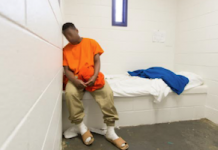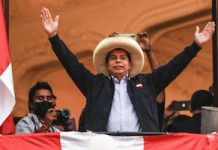
On June 22, Senate Democratic leaders called for a test vote in an attempt to advance the For the People Act legislation that most importantly would stop the new wave of Republican voter suppression bills across the country. The measure would expand ballot access, reduce the influence of money in politics and limit partisan gerrymandering. As expected, Senate Republicans invoked the filibuster, essentially killing debate on the legislation.
While polls have found that the For the People Act has strong bipartisan support nationally, Republican Senate Minority Leader Mitch McConnell opposes it, claiming that the bill is a Democratic “power grab.”
According to the Brennan Center for Justice, 389 GOP voter suppression bills have been introduced in 48 states, 22 of which have become law in 14 states.
One senator whose vote is critical to the passage of any legislation in the 50-50 Senate is West Virginia Democrat Joe Manchin. Manchin, who is opposed to elements in the For the People Act, has released an outline of a pared down version of the bill. While he’s also opposed to abolishing the filibuster, he’s indicated he may be open to reforming it. Between The Lines’ Scott Harris spoke with Karen Hobert Flynn, president of Common Cause, who discusses her group’s campaign supporting Senate passage of the For The People Act and the John Lewis Voting Rights Advancement Act – as well as strategies for overcoming the GOP filibuster.
KAREN HOBART FLYNN: When Joe Manchin came out to talk about different pieces of the package that he supported, he talked about the banning partisan gerrymandering, making Election Day a public holiday, mandating at least 15 days of early voting, automatic voter registration, absentee ballots and many other pieces. And, many on the Capitol see Joe Manchin as one of many senators, a hundred senators. It’s the first foray into a discussion about what should be included in the package. Actually, Sen. Sinema in Arizona is a co-sponsor of For the People Act. So we’re not concerned about elements of the package for Sen. Sinema. Both Sens. Sinema and Manchin have talked about concerns around eliminating the filibuster. But one of the interesting things is that Manchin has talked about being open to reform of Senate rules, like allowing talking filibuster.
So, you know, one of the challenges with the filibuster as it has grown out, as Mitch McConnell has sort of taken advantage of it and continued to use it to block and try and, you know, eliminate most of what President Obama did during his administration (and) trying to block Joe Biden’s reforms that he might want to pass. They have used the threat of a filibuster where 41 senators say that they’re not going to support the bill. So don’t bring it up.
You know, many, many years ago we used to have a talking filibuster. If anybody has seen “Mr. Smith Goes to Washington” — and that is requiring those who want to block action to actually take the floor and hold the floor to debate the issue and not cede the floor. And so, Joe Manchin has talked about being open to moving and shifting that balance back to those who are going to filibuster and require them to hold the floor in order to block action. People can’t do that forever. And after that debate and there has been an ample discussion of an issue, then you can move it forward.
He’s also talked about being willing to look at issues that sort of switch how many senators are required to overcome a filibuster. Back in, I think 1975, it was 67 votes. That threshold was lowered to 60. And one of the things we’ve heard from the Intercept article and other talk on the Hill is that he’d be willing to look at, you know, maybe 55. So there is an opening to be looking at other possibilities. It may not be eliminating the filibuster altogether, but it could be amending some rules so that critical reforms, voting reforms like the For the People Act, as well as the John Lewis Voting Rights Advancement Act can move forward. So we see this as a very positive sign.
SCOTT HARRIS: I thought it was a positive development that Georgia democracy activist Stacey Abrams, a former gubernatorial candidate in Georgia who’s got a large following and has certainly made her mark on politics in Georgia basically came out in support of the pared down For the People Act that was proposed by Joe Manchin. How do you think the rest of the country should respond to this compromise position that Joe Manchin has put out there?
KAREN HOBART FLYNN: The outline that Joe Manchin put out was just that — an outline. And there’s a lot that is not clear in what he put forward. So, you know, details will matter. And I think Stacey Abrams in our interview said, “This is a great start and you know, something that we can work with.” And I really agree with that. I believe that over the coming weeks, we will see senators debating what those pieces will look like. I expect to see continued negotiations around this over the coming weeks. And it’s important that we see this move before the end of the summer. On the issue of gerrymandering, we will see data come out for states to start drawing their district lines, probably by mid-August. We know that there are many states ready to pass highly partisan, rigged, district lines that will silence black and brown voters voices in their democracy for the next decade. And so the stakes, I believe are very high.
The challenges we have seen so many Republicans move so far to the right that we are not talking about democracy anymore. We’re talking about a coordinated effort to block and silence people’s voices in their elections. You know, use whatever means possible, whether it’s disinformation or lies, whether it’s voter suppression or racial and partisan gerrymandering. Or whether it is stripping the power of those that could certify the vote. What we’re talking about is the kind of thing that we see dictators and authoritarian regimes take up. And it is a huge danger to our democracy and one that people are understanding, and we are seeing more people engaged because of the very threat we face.
This is going to be the summer of mobilizations. We are continuing to organize and get people revved up to be fighting for their rights. So it is both exciting to see because so much of what people have had to do was over the phone, online, and other things because of COVID. But, this will be the summer of democracy mobilizations all over the country. And I hope that your listeners will think about engaging. It doesn’t matter if you’re in Connecticut, New York or other places where you see some reforms moving. The fact is there are things that you could be doing right now.
For more information on Common Cause, visit CommonCause.org.




